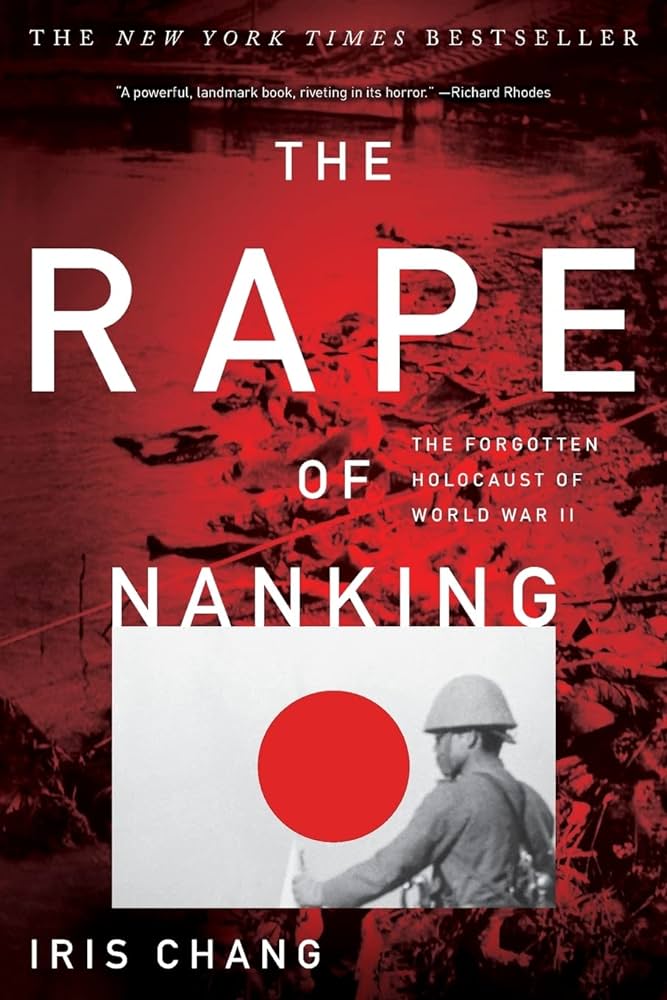
Top 30 Cartoon Characters That Were Villains
Our list rounds up the top 30 cartoon characters that were villains, each one more wonderfully wicked than the last.
history, japan, Nonfiction
The Rape of Nanking: The Forgotten Holocaust of World War II is unflinching and unwavering in its portrayal and indictment of the evil Japan wrought on Nanking, China.

The Chronicle of humankind’s cruelty to fellow humans is a long and sorry tale. But if it is true that even in such horror tales there are degrees of ruthlessness, then few atrocities in world history compare in intensity and scale to the Rape of Nanking during World War II
🖤
Before I read Pachinko and How We Disappeared, what I knew about Japan was that they made fantastic video games and anime. They still do, but I now have the added knowledge of their atrocities during their imperialism days.
The Rape of Nanking: The Forgotten Holocaust of World War II is unflinching and unwavering in its portrayal and indictment of the evil Japan wrought on Nanking, China. When you read this book, do not look for reasons for why Japan did what it did. I personally feel this is a disrespect to victims when people try to find ways to humanize why some people do heinous shit.
There is little value in seeking to find reasons for why people do what they do, or feel the way they feel. Hatred is a most pernicious weed, finding root in any kind of soil. It feeds on itself. With Words…
House of Chains
Form an opinion, say it often enough and pretty soon everyone’s saying it right back at you, and then it becomes a conviction, fed by unreasoning anger…
🖤🖤
A random thought I had when reading this book was I really think people thought imperialism was a cute thing. That’s the only way I can explain it, to be honest. I don’t know if I should call this author naive, but there’s a part in this book where she postulates that governments of other nations probably did not know what was happening, and as dark as this book is, that just made me chuckle, and go, “yeah right.”
Nations have no morals. Only interests
City of Stairs
I personally think America would not have intervened in Japan’s Imperialism quest if Japan had just stayed in her lane. As we all know, prior to this, Japan already had its foot on Korea. European countries were still carving out African countries left, right, and center. My country, Nigeria, got its independence from Britain on October 1st, 1960. Heck, even America would not sign a Civil Rights Act until 1964.
So Japan’s brazen attitude in shrugging off its atrocities during its Imperialism days should really not come as a shock. It is no less than what other European governments have also done and continue to do.
Either way, the strength of this book remains in Iris Chang saying that through this book, she, and by extension, China, will not forget.

Profile: I am the girl who stepped out of her comfort zone and sort of embraced all books.. Rare YA reader Occasional love affair with romance books because who doesn't need to swoon once in a while. Adult Fantasy is my one true love & i enjoy good thrillers and horror books.

Our list rounds up the top 30 cartoon characters that were villains, each one more wonderfully wicked than the last.

DC is great at making comics and animated movies, while the MCU has the upper hand in its cinematic aspects

Discover the best apps to read books for free in 2025. Access thousands of free e-books and audiobooks on your phone or tablet. ...

There are some outright funny cartoon characters who exist solely to crack you up, loud, hard, and with zero apology.

Things Fall Apart is for the colonizers as well as the colonized, helping to understand the role of colonialism in the realization...

While many of the Nollywood movies on our list are quite old, it’s a testament to the capabilities of the industry’s p...

While this isn’t an exhaustive list, it comprises some of the most popular mythical creatures from around the world.